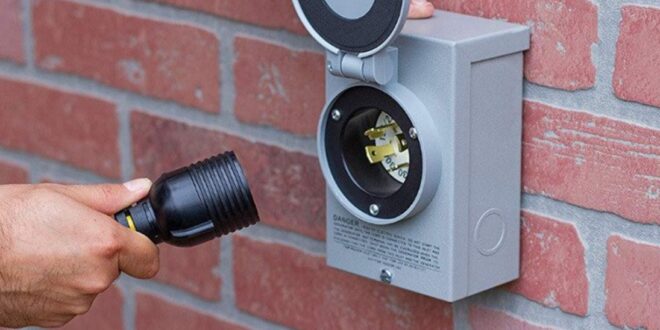Typically, extension cords are power cables that allow you to operate devices at a distance. These cords have a plug that can be connected to the supply and multiple outlets at the other end allow connecting devices. They are readily available in the market in different sizes of gauge and length. To find a suitable extension cord for your use click here and choose from a wide range of options.
You should keep in mind that not all extension cords are compatible with all types of generators. You have to assess your needs and buy the right power cord for portable ones. Many people are either unaware or choose to overlook the importance of picking the right one. Portable generators are often used to run outdoor appliances by drawing the supply from indoors.
Many times the appliances connected with these generators are expensive such as mini-refrigerators or furnaces. For that reason, the most appropriate choice of the extension cord is imperative to ensure the efficient operation of the generator and prevent damage to the generator and connected devices. Here is everything you need to know about portable generator extension cords that will help you make a more informed decision.
Need for extension cords
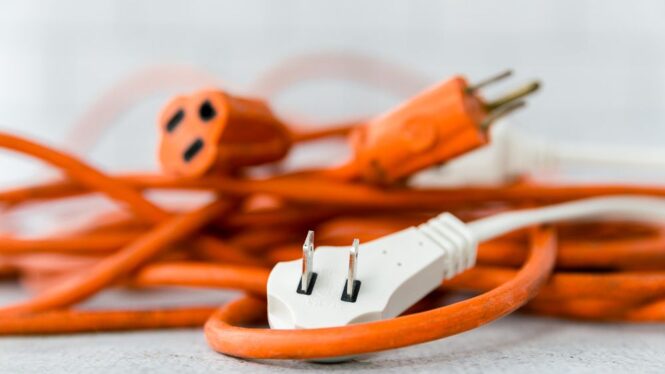
Although portable generators can be moved around in the house, extension cords take their reach a step ahead. With their help, connecting devices becomes much easier and faster. It serves as an immediate solution in case of a sudden power outage.
You can connect multiple cord-and-plug such as window air conditioners, refrigerators, etc. to the outlet panel of the generator in no time. The only thing you need to keep in mind is that you have the right length and gauge of the extension cord to ensure the safe operation of the devices.
Selecting the right extension cord
One simple rule of thumb that you should remember while selecting an extension cord is – As the number of amperes you draw from the outlet of the generator increases, you need thicker copper wire inside the extension cord. Meaning, you need to have a thick wire to draw more power from it.
The thickness of the cords is rated as per industry standards in terms of gauge numbers. A lower gauge number signifies that the wire is thicker and has more capacity to bear the load.
You should also consider the length of the wire as it also plays a crucial role in the flawless function of the cord. For instance, to draw a 15 Amp current, you can choose AWG (American Wire Gauge) 14 wire and extend around 65 feet. Or, you can choose AWG 12 wire and draw it up to 100 feet.
How does the length of the cord affect rating?
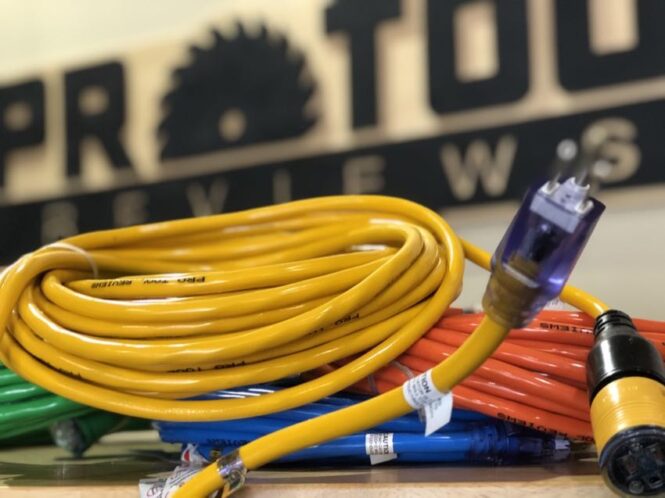
While most people are clear about the effect of the gauge of the wire on its function, many are unaware of how the length affects the rating. Well, the concept is similar to the one that is followed in the cables that bring electricity to your house. As the distance increases, voltage drops.
Every wire has some resistance that depends on several factors including gauge and type. Mostly, extension cords that are used for outdoor purposes come in lengths 25 feet and 50 feet. As the length (distance to which the current is drawn) increases, the resistance across the wire drops the voltage. Ideally, you should remain within 50 feet when working with portable generators outdoors.
Traditional cords vs Gen cords
Most often when you use a generator outdoors, you take the extension one through an open door or window. This practice results in several drawbacks when you choose a traditional one.
You will be unable to connect the hardwired equipment such as ceiling fans, well pumps, furnace fans, etc. These appliances do not connect with the wire so cannot be powered using extension cords.
Too long a wire can cause significant damage to the generator and appliances. Additionally, if you run the wire under a rug or carpet, the heat build-up can result in sparking or even fire. It is tedious and time-consuming to manage a long or big bunch of wires.
Gen-cords liberate you from all these issues. You can simply connect them to the generator outlet and run them through an open door or window. The other end of the wire splits into 3-4 120 volt outlets that you can connect to multiple appliances or other extension cords. They also come in straightforward sizing making it easy to purchase the appropriate one.
Using two cords with a generator
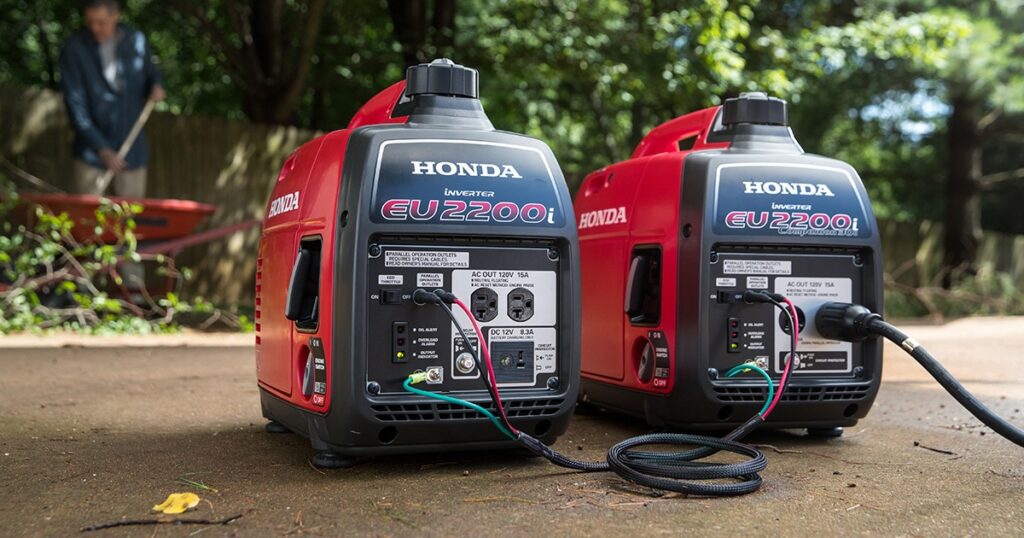
Some generators provide more than one outlet circuit. In such a case, it is advised to use multiple extension cords. You can use one cord for each circuit to balance the overall load. Consider a generator that is rated 3500 Watts for power. It serves with multiple outlets, 120 volt each, and has a multi-prong high-power outlet. You can easily use 12/3extension cords and power several appliances inside your home.
Advantages of using extension cords with generators
• Instant solution
Extension cords are the reliable and rapid solution to power your appliances that are far away without moving them closer to the generator. These are highly efficient during a sudden short-term outage allowing quickly connecting stand-alone devices.
• Easy installation without specialization
The installation of extension cords and subpanels is as simple as it can be. You do not have to call an expert electrician for the job.
• Pocket-friendly
They cost remarkably lower as compared to their counterparts such as transfer switches. You only have to spend a few hundred dollars at the most to resolve your power issues.
Limitations of extension cords
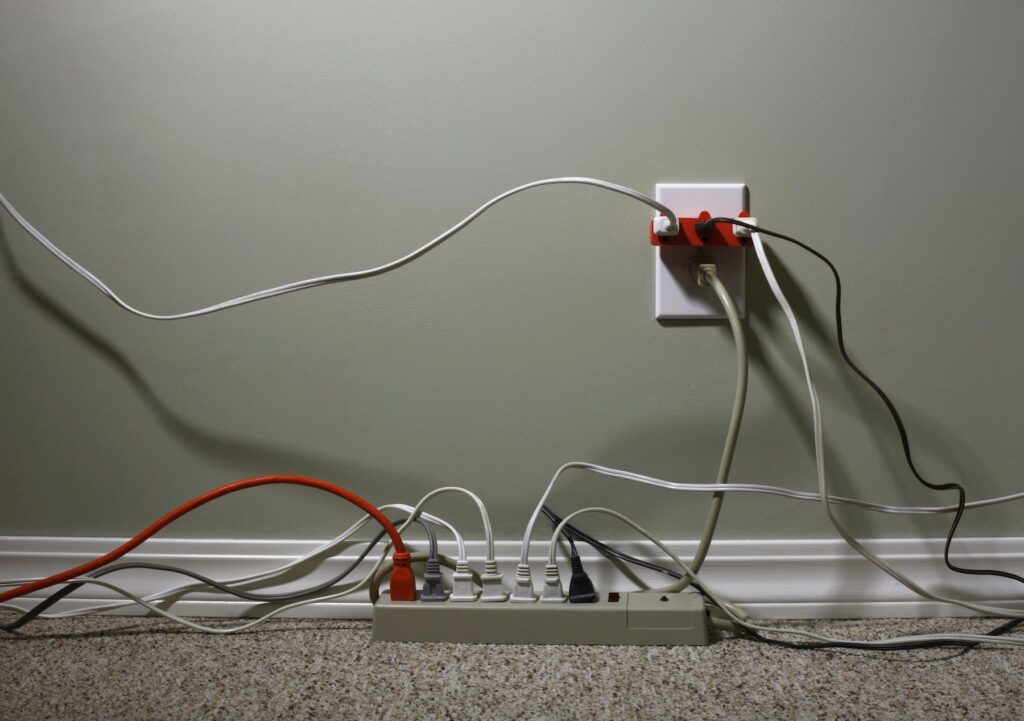
• Does not work for hardwired appliances
You cannot use extension cords for hardwire items such as ceiling fans, lights, etc. To power these devices through them, you will have to manually disconnect them from the wiring and reconnect to the cord.
• Not suitable for long-term blackouts
Most of the essential devices and appliances in your house are hardwired. As mentioned earlier, these appliances cannot be connected using cords. For that reason, they are not suitable for long blackouts.
• The arrangement is prone to damage
Extension cords are known to run several meters through open doors and windows. This makes them prone to accidents and exposes them to bad weather. If not used carefully, these can lead to erosion of the wire material, electric shocks, and other damages.
 Imagup General Magazine 2024
Imagup General Magazine 2024
